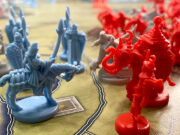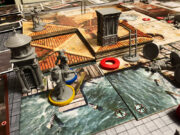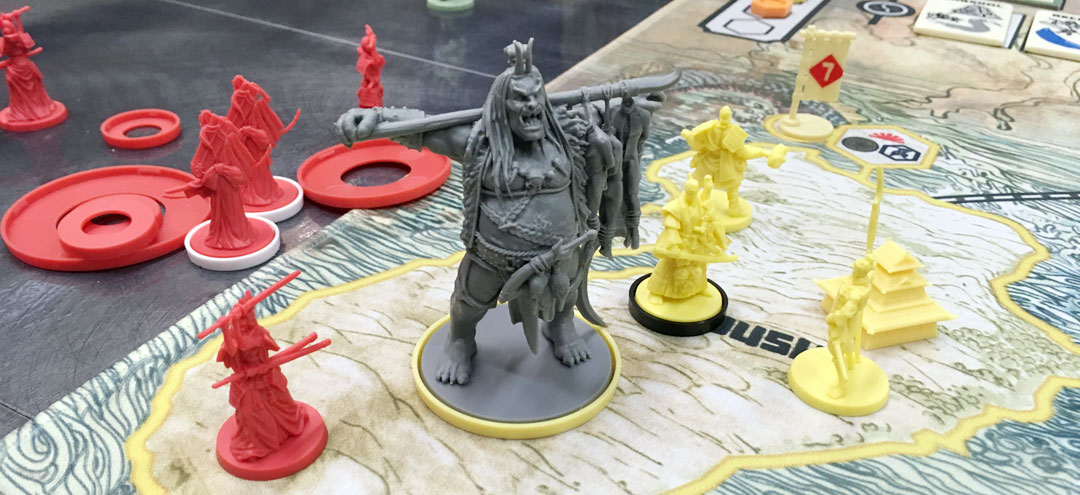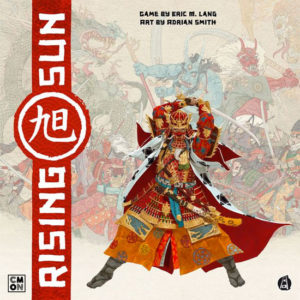 CMON Games is a Kickstarter household name. Almost everyone who watches the roll of games disembarking the Kickstarter pledge train has seen big numbers for one or two CMON titles. With our next game up for review, it was a foregone conclusion that the funding would feature CMON campaign hallmarks and hit high numbers.
CMON Games is a Kickstarter household name. Almost everyone who watches the roll of games disembarking the Kickstarter pledge train has seen big numbers for one or two CMON titles. With our next game up for review, it was a foregone conclusion that the funding would feature CMON campaign hallmarks and hit high numbers.
That isn’t necessarily to say the game is good. For this reviewer, the pledge for Rising Sun was a real risk since there was a lot of information about gameplay, including video playthroughs, but backers never know for sure if every game experience will be as enjoyable as it seems. Board Game Grow readers will want to know if it lives up to the experience it promises.
The experience delivered in Rising Sun has every player in the role of leader of one of six clans based on a fictional version of a medieval Japan where gods (Kami) and monsters (Oni) can influence battles. It’s meant for 3 to 5 players and is best at 4 or 5. It takes roughly 30 minutes per player to play.
Gameplay Overview:
At its core, Rising Sun is not a complex game. Over three seasons (rounds), players are trying to earn the most victory points by making alliances and conquering the most territories they can. They do this through hiring forces, gaining succor from the gods, and making alliances for the best possible outcomes.
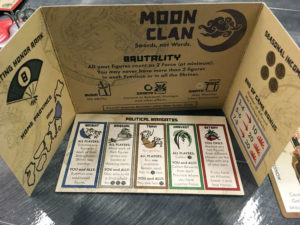
On a round, players gain a set amount of income and proceed through an initial phase of alliance making. Once alliances are chosen, play proceeds turn by turn with an action selection and follow mechanism. This means the active player chooses an action from four randomized tiles. Then, every other player may follow that action. The choosing player and their ally (if any) receive a bonus action or discount depending on the action.
The main goal each round is to place new units in the various territories on the board in order to eventually have the strongest force when battles are resolved at the end of the round. Players could also be aiming to gain the favor of the gods by having the most force on the Kami tiles, which grant powerful abilities. Players can also take actions to select season cards which grant even more special abilities.
In the final stage of the round, conflict within provinces is the focus. The War Phase resolves battles province by province with players secretly bidding on actions. The highest bidder resolves the action. These actions in order of resolution are:
Commit Seppuku – ritual suicide of a player’s forces, gaining 1 point for each
Take a Hostage – capture one unit of an opposing force
Hire Ronin – add to the battle any Ronin units already acquired
(After Ronin are hired, the battle resolves. The player with the highest force wins. All other units except for allied player units die.)
Write Poetry of the Dead – gain 1 point for each unit killed, even those who have committed Seppuku
After three rounds, players receive endgame points for number of territories conquered and bonuses from any season cards acquired.
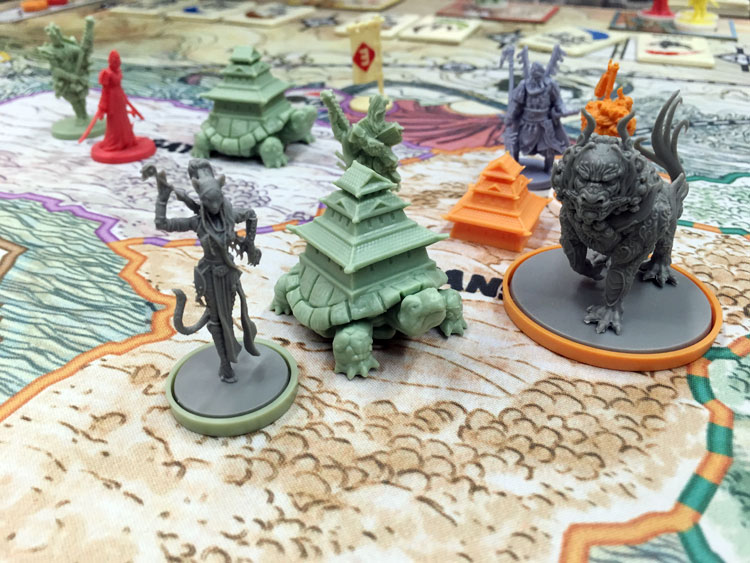
Game Experience:
Since the game reviewed is this reviewer’s copy from backing the Kickstarter, some of what can be seen in the pictures are upgraded components. The retail copy will not have all these items. With that being said, this review will try to stick with gameplay.
To cut to the heart of the matter, for this reviewer, Rising Sun is the real deal. It delivers everything it promised in terms of gameplay. While not perfect, it is exceptional. It won’t appeal to a broad range of players, but to the core audience, what it does deliver is well crafted.
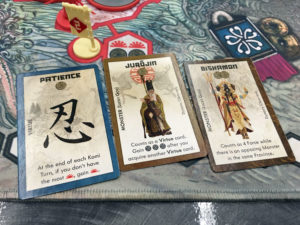
What might be surprising, and the only point where it really shares lineage with Blood Rage, is that this is not really a fighting game. It is a game of choosing a path through conflict. There are many ways to gain points and some involve fighting, but some don’t. Simply having a large amount of money and strategically bidding during the war phase can often win.
This brings light to the kind of replay value Rising Sun has. While the map doesn’t change from game to game, practically everything else does because the rules are minimal. The game is driven by opportunity choices. This makes the story of each game new. However, some players might be frustrated with the somewhat limited content in the core box. Having played with some of the expansion content, I’m loathe to consider playing without these options.
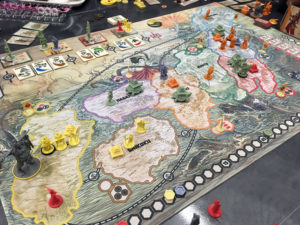
The downside to Rising Sun comes from its main play structure. Each player will have various opportunities which depend highly on the random choices afforded to the player and their ally. Going at it alone can be done, but is rarely the most efficient path. The ally component demands that players pick others who will choose actions they also want. This is a difficult task and it may also result in too few moments for performing the action really wanted, especially at higher player counts. With fewer players, players will have more choice, but the game plays more static since fewer provinces go to war.
Finally, and of course readers are likely to suspect it already, the physical components delivered are extremely well done, the miniatures especially. While the retail box does not have the real chrome promised in the upgraded pledge levels, it still looks good on the table.
Final Thoughts:
Rising Sun is an excellent game. It’s fun, has interesting decisions and strategy, but doesn’t have the same complex depth of many other big games. It’s a showpiece with a grandiose play style that’s sure to appeal to an audience for epic, medium weight conflict-heavy games. A small player count is recommended for a first play of Rising Sun to “see” what the game offers and then at larger player counts to experience a different level (and the fully intended experience) of alliance making.
Final Score: 4 Stars – A stellar production is equaled by deep, satisfying, if somewhat challenging gameplay. However, the replay value is high (even more with almost necessary expansions) with loads of options to explore.
 Hits:
Hits:
• Production quality
• Social, strategic, and tactical decisions
• High variability from play to play, but more with expansions
Misses:
• Social aspects don’t always bear out in adding to choice
• Expansions really necessary for the full experience




